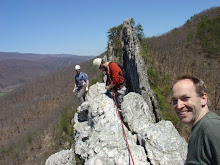This was one of the Buddhist temples we visited in Tonghai, like the Confucian temple built by the Mongolians which we would visit later, this temple had become an active grounds for the elderly community.
 There were no saffron robes, neither heaping mounds of incense, nor mystical chanting of mantra filling the air. The temple, now turned into a tourist attraction, seemed dead. Religion seemed to have left it long ago leaving behind rotting statues of the Buddha and famous boddhisatvas.
There were no saffron robes, neither heaping mounds of incense, nor mystical chanting of mantra filling the air. The temple, now turned into a tourist attraction, seemed dead. Religion seemed to have left it long ago leaving behind rotting statues of the Buddha and famous boddhisatvas.
 We ate lunch at the temple, in the small courtyard at the base of the mountain complex. The monks and cooks had prepared for us a vegetable meal of feast proportion,
We ate lunch at the temple, in the small courtyard at the base of the mountain complex. The monks and cooks had prepared for us a vegetable meal of feast proportion,  including tofu which tasted exactly like meat, crafted into sausage and fish shape.
including tofu which tasted exactly like meat, crafted into sausage and fish shape.
 There were no saffron robes, neither heaping mounds of incense, nor mystical chanting of mantra filling the air. The temple, now turned into a tourist attraction, seemed dead. Religion seemed to have left it long ago leaving behind rotting statues of the Buddha and famous boddhisatvas.
There were no saffron robes, neither heaping mounds of incense, nor mystical chanting of mantra filling the air. The temple, now turned into a tourist attraction, seemed dead. Religion seemed to have left it long ago leaving behind rotting statues of the Buddha and famous boddhisatvas.The only existing community consisted of a few cooks and two monks dressed in grey boiler suit jackets.
The eldest of the two monks was eager to speak to us, approaching us with rapid Chinese and a large smile. He approached me as well, but I couldn't understand him. In desperation I simply said, Wo de Hanyu bu hao (My spoken Chinese is not good). He simply smiled, repeated what I said, and just sat in silence next to me.
Charles, one of our teachers and our interpreter, said the temple was Chen Buddhist, a sect of buddhism which established itself on action, not removed doctrine.
 We ate lunch at the temple, in the small courtyard at the base of the mountain complex. The monks and cooks had prepared for us a vegetable meal of feast proportion,
We ate lunch at the temple, in the small courtyard at the base of the mountain complex. The monks and cooks had prepared for us a vegetable meal of feast proportion,  including tofu which tasted exactly like meat, crafted into sausage and fish shape.
including tofu which tasted exactly like meat, crafted into sausage and fish shape. The vegetarian diet is a distinct characteristic of non-Tibetan Buddhism. After the meal we were free to explore the mountain. The vast complex stretched up the side of a mountain, tucked away behind forest and rock.





